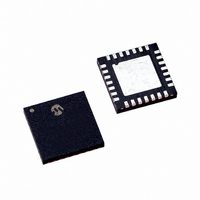PIC16F88-I/ML Microchip Technology, PIC16F88-I/ML Datasheet - Page 162

PIC16F88-I/ML
Manufacturer Part Number
PIC16F88-I/ML
Description
IC MCU FLASH 4KX14 EEPROM 28QFN
Manufacturer
Microchip Technology
Series
PIC® 16Fr
Datasheets
1.PIC16F616T-ISL.pdf
(8 pages)
2.PIC16F688T-ISL.pdf
(688 pages)
3.PIC16F818-ISO.pdf
(6 pages)
4.PIC16F87-IP.pdf
(228 pages)
5.PIC16F87-IP.pdf
(8 pages)
6.PIC16F87-IP.pdf
(4 pages)
7.PIC16F87-IP.pdf
(8 pages)
Specifications of PIC16F88-I/ML
Core Size
8-Bit
Program Memory Size
7KB (4K x 14)
Core Processor
PIC
Speed
20MHz
Connectivity
I²C, SPI, UART/USART
Peripherals
Brown-out Detect/Reset, POR, PWM, WDT
Number Of I /o
16
Program Memory Type
FLASH
Eeprom Size
256 x 8
Ram Size
368 x 8
Voltage - Supply (vcc/vdd)
4 V ~ 5.5 V
Data Converters
A/D 7x10b
Oscillator Type
Internal
Operating Temperature
-40°C ~ 85°C
Package / Case
28-VQFN Exposed Pad, 28-HVQFN, 28-SQFN, 28-DHVQFN
Controller Family/series
PIC16F
No. Of I/o's
16
Eeprom Memory Size
256Byte
Ram Memory Size
368Byte
Cpu Speed
20MHz
No. Of Timers
3
Processor Series
PIC16F
Core
PIC
Data Bus Width
8 bit
Data Ram Size
368 B
Interface Type
SSP, USART
Maximum Clock Frequency
20 MHz
Number Of Programmable I/os
16
Number Of Timers
8
Operating Supply Voltage
2 V to 5.5 V
Maximum Operating Temperature
+ 85 C
Mounting Style
SMD/SMT
3rd Party Development Tools
52715-96, 52716-328, 52717-734
Development Tools By Supplier
PG164130, DV164035, DV244005, DV164005, PG164120, ICE2000, DM163014
Minimum Operating Temperature
- 40 C
On-chip Adc
10 bit
Lead Free Status / RoHS Status
Lead free / RoHS Compliant
For Use With
XLT28QFN3 - SOCKET TRAN ICE 18DIP/28QFNAC164322 - MODULE SOCKET MPLAB PM3 28/44QFNAC164033 - ADAPTER 28QFN TO 18DIPDV007003 - PROGRAMMER UNIVERSAL PROMATE II
Lead Free Status / Rohs Status
Details
- PIC16F616T-ISL PDF datasheet
- PIC16F688T-ISL PDF datasheet #2
- PIC16F818-ISO PDF datasheet #3
- PIC16F87-IP PDF datasheet #4
- PIC16F87-IP PDF datasheet #5
- PIC16F87-IP PDF datasheet #6
- PIC16F87-IP PDF datasheet #7
- Current page: 162 of 688
- Download datasheet (3Mb)
PICmicro MID-RANGE MCU FAMILY
10.1
DS31010A-page 10-2
Introduction
Some devices have an 8-bit wide Parallel Slave Port (PSP). This port is multiplexed onto one of
the devices I/O ports. The PORT operates as an 8-bit wide Parallel Slave Port, or microprocessor
port, when the PSPMODE control bit is set. In this mode, the input buffers are TTL.
In slave mode the module is asynchronously readable and writable by the external world through
RD control input pin and the WR control input pin.
It can directly interface to an 8-bit microprocessor data bus. The external microprocessor can
read or write the PORT latch as an 8-bit latch. Setting the PSPMODE bit enables port pins to be
the RD input, the WR input, and the CS (chip select) input.
There are actually two 8-bit latches, one for data-out (from the PICmicro) and one for data input.
The user writes 8-bit data to PORT data latch and reads data from the port pin latch (note that
they have the same address). In this mode, the TRIS register is ignored, since the microproces-
sor is controlling the direction of data flow.
Figure 10-1
Figure 10-1: PORTD and PORTE Block Diagram (Parallel Slave Port)
Note 1: At present the Parallel Slave Port (PSP) is only multiplexed onto PORTD and
Note 2: In this mode the PORTD and PORTE input buffers are TTL. The control bits for the
Note: I/O pins have protection diodes to V
Data bus
One bit of PORTD
Set interrupt flag
PSPIF
PORTE. The microprocessor port becomes enabled when the PSPMODE bit is set.
In this mode, the user must make sure that PORTD and PORTE are configured as
digital I/O. That is, peripheral modules multiplexed onto the PSP functions are dis-
abled (such as the A/D).
When PORTE is configured for digital I/O. PORTD will override the values in the
TRISD register.
PSP operation are located in TRISE.
shows the block diagram for the PSP.
RD Port
WR Port
Q
D
CK
EN
EN
EN
D
Q
DD
and V
SS
.
TTL
Read
Chip Select
Write
1997 Microchip Technology Inc.
TTL
TTL
TTL
PSP7:PSP0
RD
CS
WR
Related parts for PIC16F88-I/ML
Image
Part Number
Description
Manufacturer
Datasheet
Request
R

Part Number:
Description:
Manufacturer:
Microchip Technology Inc.
Datasheet:

Part Number:
Description:
IC MCU FLASH 4KX14 EEPROM 18DIP
Manufacturer:
Microchip Technology
Datasheet:

Part Number:
Description:
IC MCU FLASH 4KX14 EEPROM 18SOIC
Manufacturer:
Microchip Technology
Datasheet:

Part Number:
Description:
IC MCU FLASH 4KX14 EEPROM 20SSOP
Manufacturer:
Microchip Technology
Datasheet:

Part Number:
Description:
IC MCU FLASH 4KX14 EEPROM 18DIP
Manufacturer:
Microchip Technology
Datasheet:

Part Number:
Description:
IC,MICROCONTROLLER,8-BIT,PIC CPU,CMOS,LLCC,28PIN,PLASTIC
Manufacturer:
Microchip Technology
Datasheet:

Part Number:
Description:
IC PIC MCU FLASH 4KX14 18SOIC
Manufacturer:
Microchip Technology

Part Number:
Description:
IC MCU FLASH 4KX14 EEPROM 18SOIC
Manufacturer:
Microchip Technology
Datasheet:

Part Number:
Description:
IC,MICROCONTROLLER,8-BIT,PIC CPU,CMOS,SSOP,20PIN,PLASTIC
Manufacturer:
Microchip Technology
Datasheet:

Part Number:
Description:
3.5KB Flash, 128B RAM, 18 I/O, CLC, CWG, DDS, 10-bit ADC 20 QFN 4x4mm TUBE
Manufacturer:
Microchip Technology
Datasheet:

Part Number:
Description:
3.5KB Flash, 128B RAM, 18 I/O, CLC, CWG, DDS, 10-bit ADC 20 PDIP .300in TUBE
Manufacturer:
Microchip Technology
Datasheet:

Part Number:
Description:
3.5KB Flash, 128B RAM, 18 I/O, CLC, CWG, DDS, 10-bit ADC 20 SOIC .300in TUBE
Manufacturer:
Microchip Technology
Datasheet:

Part Number:
Description:
3.5KB Flash, 128B RAM, 18 I/O, CLC, CWG, DDS, 10-bit ADC 20 SSOP .209in TUBE
Manufacturer:
Microchip Technology
Datasheet:

Part Number:
Description:
3.5KB Flash, 128B RAM, 18 I/O, CLC, CWG, DDS, 10-bit ADC 20 QFN 4x4mm TUBE
Manufacturer:
Microchip Technology
Datasheet:

Part Number:
Description:
3.5KB Flash, 128B RAM, 18 I/O, CLC, CWG, DDS, 10-bit ADC 20 PDIP .300in TUBE
Manufacturer:
Microchip Technology
Datasheet:










